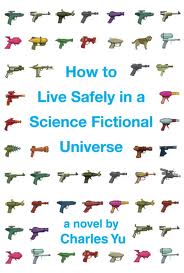Rating: 3 and ½ Stars
“Time is a machine: it will convert your pain into experience. Raw data will be compiled, will be translated into a more comprehensible language. The individual events of your life will be transmuted into another substance called memory and in the mechanism something will be lost and you will never be able to reverse it, you will never again have the original moment back in its uncategorized, preprocessed state. It will force you to move on and you will not have a choice in the matter.”
- - How to Live Safely in a Science Fictional Universe
At the beginning of Charles Yu’s book, there is an inverted Zen to the protagonist’s concept of Time Travel. Instead of living in the Eternal Present, he is hiding in the ‘Present Infinite’.
Wandering into this author’s mind is a trippy experience. The first few chapters left me wondering what rabbit hole I had fallen into. But once he stops being head-spinningly clever, it’s easier to appreciate a book that is deeply insightful, while still managing to be both funny and sad, very often all three at the same time. Yu’s novel is a philosophical one at the core. His hero is a solipsist who ruefully sees that the most intense love-affair he will have is with himself. Not only is he his own lover, he is also his own friend, foe, and mentor.
The hero of our novel, also called Charles Yu, is a time-traveling trouble shooter in a science fictional world – Minor Universe 31. He junkets around in the TM31 with his dog, Ed, and TAMMY, the computer operating system that he has a crush on. He is in a service profession, where his main job is to extricate people who bumble out of the Present, mostly trying to redo some point in their past.
Yu understands that the whole point of time-travel is to transform our lives by rectifying past errors and forestalling future calamities. Ironically, this is not possible because it would warp the thin fabric of reality. The time travelers face the prospect of yo-yoing between Past, Present and Future time zones without making the slightest dint of impact in their pre-destined lives.
Perhaps the most inventive thing about this book is Yu’s writing. Both Science and Language are expressions of thought, and he expresses himself in a bright, sparkling style. It is not however entirely free from flaws. He tends to use rather more words than strictly necessary, and meaning occasionally founders under a miasma of technical jargon.
His greatest strength is his understanding of the delicate, tenuous nature of human relationships, and the intimate dynamics of family life. In his book, Time is not the span separating Present from Past or Future. It is the distance between our dreams and disappointments, love and longing, hope and regret.


No comments:
Post a Comment